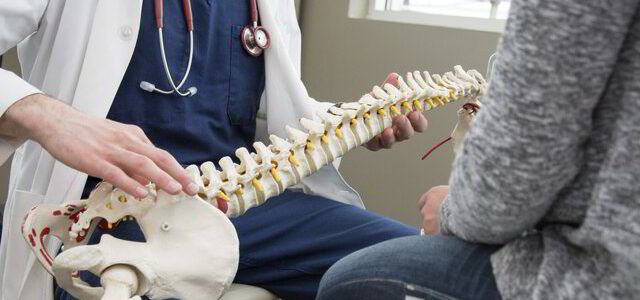
If you have been diagnosed with a back condition and told that surgery is your best option, you will likely be faced with some difficult decisions. It is important that you know how to prepare for surgery. Here, we share what your preparation should look like and some steps you can take prior to surgery to ensure that your recovery goes as smoothly as possible.
While the specific instructions in preparing for spinal surgery can vary depending on your condition and procedure, the following tips are generally recommended for any patients undergoing general anesthesia.
Anatomy of the Spine
Your spine is made of 26 bones called vertebrae (7 cervical, 12 thoracic, 5 lumbar, the sacrum and coccyx). Except for the top two neck vertebrae, each vertebrae is separated by a disc. Each disc contains a soft, jelly-like center surrounded by a tough outer layer of fibers known as the annulus. Discs, bone, ligaments and strong muscles stabilize the spine. The muscles control movement. Inside the spine is called the spinal cord.
The spinal cord is composed of nerves leading to and from the brain. It controls and transmits all muscle movement and sensation for the arms, legs and trunk. Nerve roots come from the spinal cord and carry electrical impulses to and from muscles, organs and other structures. These nerve roots can become pinched or irritated by abnormal conditions.
A compression injury to your back can cause a disc to rupture. This can create spinal instability and/or nerve symptoms (numbness, tingling and changes in sensation).
Spinal curvatures called scoliosis can be due to degenerative changes, instability, or an unknown cause. These conditions can also be corrected by a spinal fusion.
Your doctor will choose the best instrumentation and procedure for your individual needs.
Types of Spine Surgeries
Talk to your doctor and neurosurgeon about your options when it comes to spine surgery. Options for spine surgery may include:
- Spinal fusion: This procedure joins together two or more vertebrae to improve stability or correct a deformity.
- Laminectomy: Also known as decompression surgery, this procedure removes the lamina to relieve pressure on nerves and spinal cord.
- Foraminotomy: This procedure enlarges the area in the spine around compressed nerves to relieve pressure.
- Vertebroplasty: This procedure is used to treat spine fractures weakened by osteoporosis by injecting bone cement.
Prepare Your Home
Following are some tips to prepare your home prior to your spine surgery to help prevent falls:
- Arrange furniture so that you have plenty of room to move about.
- Remove clutter (e.g. newspapers, toys) to prevent tripping and/or falling.
- Watch out for pets. Consider keeping them contained when you are walking around.
- Keep electrical cords out of walkways.
- Keep a small table with frequently needed items close to your chair/bed.
- Keep a telephone within easy reach.
- Make arrangements to stay on the first level if you have stairs to your bedroom.
- Consider an alternate entrance if there are many stairs leading into your house.
- Arrange your cabinets so that frequently used items are within easy reach.
- Be aware of doorway thresholds and waxed floors as these can lead to falls.
Two Weeks Before Surgery
- Schedule pre-admission testing.
- Discuss any medications you are taking with your doctor and your family physician to see which ones you should stop taking before surgery.
- Discuss with your doctor options for preparing for potential blood replacement, including donating your own blood, medical interventions and other treatments, prior to surgery.
- If you are overweight, losing weight before surgery will help decrease the stress you place on your new joint. However, you should not diet during the month before your surgery.
- If you take diet pills or arthritis/anti-inflammatory medications, stop taking them two weeks before surgery.
- If you take any supplements, vitamins, herbs or fish oil, stop taking them 10 days before surgery.
- If you take aspirin or blood thinners, your surgeon will want you to stop taking these medicines before your surgery.
- If you smoke, you should stop or cut down to reduce your surgery risks and improve your recovery.
- Have any tooth, gum, bladder or bowel problems treated before surgery to reduce the risk of infection later.
- Report any infections to your surgeon. Surgery cannot be performed until all infections have cleared up.
- If there is a chance you may go to a skilled nursing facility before going home, begin looking at facilities that are convenient to you and choose one.
One Week Before Surgery
- Walk around your home and make sure the things you need on a daily basis will be easy to reach after surgery.
- Clean your house and do the laundry.
- Put night lights in the bathrooms and hallways.
- Stock up on groceries. Cook ahead of time and freeze some items that can be reheated easily.
- Review your instructions from pre-admission testing.
- If you have diabetes and take insulin at night, ask the doctor who prescribes your insulin about the proper dose the day before surgery.
- If you take erectile dysfunction medicines like Viagra, Cialis or Levitra, you must stop them two days before surgery or your surgery will be canceled.
- If you have a living will, set a copy aside to bring to the hospital on the day of surgery.
- Pack your bag for surgery day. Do not bring jewelry or valuables. The shoes you bring should have a rubber sole so you will not slip and fall when walking after surgery.
The Night Before Surgery
-
- Shower with the chlorhexidine gluconate (CHG) antibacterial soap you were given. If you did not receive a bottle of CHG soap during pre-admission testing or you are allergic to it, you may use Dial soap.
- Sleep on clean sheets and in clean pajamas.
- Do not eat or drink anything after midnight.
- Call your surgeon if you have had any changes in your health, including fever, a skin sore, vomiting, diarrhea, infection, cough, cold, wheezing, chest pain or shortness of breath.
After Your Surgery
Once your surgery is complete, your work is actually just beginning! Complete preparation for spine surgery includes thinking through all the details of recovery and care after you come home.
- Rearrange your home. You will be able to walk after surgery but you will need to navigate carefully as you heal and recover, so moving some furniture around or setting up a temporary bedroom for yourself downstairs might be helpful.
- Beside the prescribed therapy, you should avoid too much activity for several weeks following your surgery. Ask someone to help you with chores like laundry, cleaning and grocery shopping.
- Schedule your rehab. This may be the most important aspect of your follow up care. Your recovery will come through a recommended regimen of exercise and physical therapy.
How Can I Get Started?
The experienced and dedicated orthopedic spine surgeons at Ventura Orthopedics are here for you. If you need spinal or back surgery, it may be time to consult a medical professional. The experienced and dedicated orthopedic surgeons at Ventura Orthopedics are here for you. We are committed to helping you through any procedure until optimum health, strength and mobility are restored.
Call us today at 800-698-1280 to schedule an appointment.

